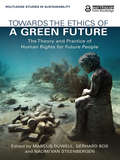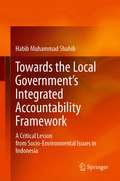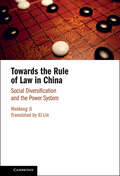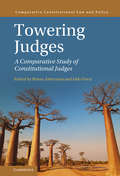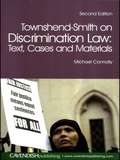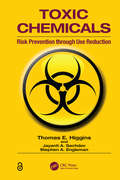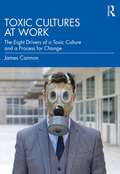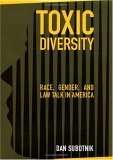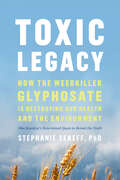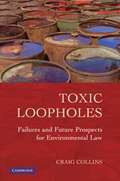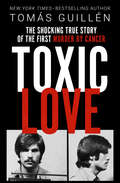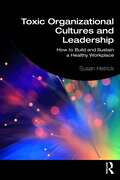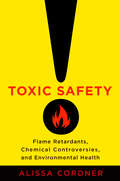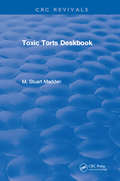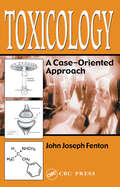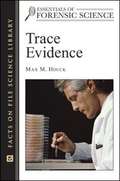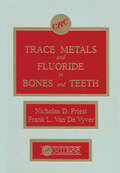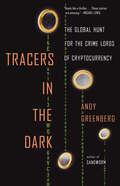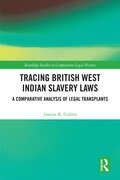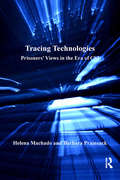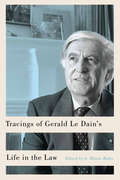- Table View
- List View
Towards the Development of the International Penal System
by Róisín MulgrewBased on extensive empirical research, this ground-breaking book describes and analyses existing systems for enforcing sentences of imprisonment imposed by international criminal courts and makes recommendations for the strategic and structural development of the international penal system. In particular, it advocates a resocialisation-focused international penal policy delivered using restorative justice modalities post-conviction and the creation of an accountable international prison system. Singly or combined, these developments will contribute to the institutionalisation of the international penal system and enhance the international nature of the sanction, the international control over the way international punishment is enforced and the equal treatment of international prisoners. These developments will also help to ensure that international punishment is principled and progressive and implemented in a humane and effective system.
Towards the Ethics of a Green Future: The Theory and Practice of Human Rights for Future People (Routledge Studies in Sustainability)
by Gerhard Bos Marcus Düwell Naomi Van SteenbergenWhat are our obligations towards future generations who stand to be harmed by the impact of today’s environmental crises? This book explores ecological sustainability as a human rights issue and examines what our long-term responsibilities might be. This interdisciplinary collection of chapters provides a basis for understanding the debates on the provision of sustainability for future generations from a diverse set of theoretical standpoints. Covering a broad range of perspectives such as risk and uncertainty, legal implementation, representation, motivation and economics, Towards the Ethics of a Green Future sets out the key questions involved in this complex ethical issue. The contributors bring theoretical discussions to life through the use of case studies and real-world examples. The book also includes clear and tangible recommendations for policymakers on how to put the suggestions proposed within the book into practice. This book will be of great interest to all researchers and students concerned with issues of sustainability and human rights, as well as scholars of environmental politics, law and ethics more generally.
Towards the Local Government’s Integrated Accountability Framework: A Critical Lesson from Socio-Environmental Issues in Indonesia
by Habib Muhammad ShahibThis book shows the growing phenomenon and the broad impact of socio-environmental conflicts in the grassroots communities—farmers, fishermen and urban poor—in Indonesia, as the effects of government’s development strategies based on neoliberal and New Public Management (NPM) views without a clear accountability system or socio-environmental accountability practices and reports are becoming apparent. Inspired by the emancipatory socio-environmental accounting discourse, which focuses on the socio-local context in developing alternative models of accountability based on local views and people's aspirations, this book uses research methodology based on the principles put forth by Indonesian national hero and critical scholar Tan Malaka to develop a framework of integrated accountability for the local government. This book fills the present gap in English publications that analyse the intents and outcomes of the public management reforms in Indonesia with regard to socio-environmental issues, as a basis for further research at the international level as well as policymaking in Indonesia. As the Indonesian government has recently undertaken key structural and accounting reforms in the public sector, this book is a timely and valuable read for graduate students, researchers,- and policymakers.
Towards the Rule of Law in China: Social Diversification and the Power System
by Weidong JiGrowing up in China while educated in Japan and the US, the author has in the past few decades both witnessed and actively participated in the historical process of legal transformations in contemporary China. Through a series of academic contributions, as well as meetings, activities and memberships with policymakers and practitioners, the author has spared no effort in applying his theoretical scholarship to real, concrete practices. He has made significant contributions to the building of a rule-of-law system in China, with great social influences. The publishing of this book is to share with English-speaking readers his insights, experiences, and practices related to the institutional undertaking of building the rule of law in China. It offers a legal perspective on some of the cutting-edge issues in our society at large (e.g. risk and uncertainty, AI network, the COVID-19 pandemic, and big data).
Towering Judges: A Comparative Study of Constitutional Judges (Comparative Constitutional Law and Policy)
by Iddo Porat Rehan AbeyratneIn Towering Judges: A Comparative Study of Constitutional Judges, Iddo Porat and Rehan Abeyratne lead an exploration of a new topic in comparative constitutional law: towering judges. The volume examines the work of twenty judges from fifteen jurisdictions, each of whom stood out individually among their fellow judges and had a unique impact on the trajectory of constitutional law. The chapters ask: what makes a towering judge; what are the background conditions that foster or deter the rise of towering judges; whether towering judges, on balance, are positive or detrimental for constitutional systems; how towering judges differ from one jurisdiction to another; how political and historical developments relate to this phenomenon; and how it fits within global constitutionalism. The answers to these questions offer important insight into exactly how these judges were able to shine to an uncommon degree in a profession where individualism is not always looked on favorably.
Townshend-Smith on Discrimination Law: Text, Cases and Materials
by Michael ConnollyDiscrimination law is rapidly expanding and of growing importance. At present the law covers gender, race and disability discrimination, sexual orientation and age. This new edition covers all of these areas. It also contains separate chapters on the social, political and philosophical aspects for those who require a fuller understanding of the background and theoretical basis of discrimination law. In addition, the book contains a section on procedural matters. It takes account of the numerous legislative developments which have taken place since the last edition. The text has also taken account of the many new cases since 1998, which include: Pearce v Governing Body of Mayfield Secondary School (2003); Nagarajan v LRT (1999); Chief Constable of West Yorkshire v Khan (2001); R v Secretary of State for Employment exp Seymour-Smith (1999 and 2000); Harvest Town Circle Ltd v Rutherford (2001); South Ayrshire Council v Morton (2002); Lawrence and Others v Regent Office Care (2002); Re Badeck (2000); Grutter v Bollinger (2003); Goodwin v UK (2002); Mendoza v Ghaidan (2002); A and Others v Secretary of State for the Home Department (2002) and A v Chief Constable of West Yorkshire (2002). This work explains and examines in-depth every possible aspect of discrimination law. It is set out in such a way that makes it accessible to readers of all levels.
Toxic Chemicals: Risk Prevention Through Use Reduction
by Thomas E. Higgins Jayanti A. Sachdev Stephen A. EnglemanCatastrophic events such as the Bhopal, India tragedy and rising incidences of cancer in areas neighboring industrial facilities have heightened concern over the use of toxic chemicals in manufacturing and industry. Based on the authors' research conducted in Sao Paulo, Brazil, this book explores the history of toxic chemical release reporting programs, presents data on the toxicity of chemicals currently in use, discusses variables that contribute to the relative toxicity of a substance, compares existing programs for reducing environmental threats, and provides specific recommendations for reducing or eliminating the use of toxic chemicals.
Toxic Cultures at Work: The Eight Drivers of a Toxic Culture and a Process for Change
by James CannonAround the world and across industries, toxic workplaces are in the news. Taking a holistic approach, this book gives a succinct summary of how toxic cultures develop and shows how they can be remedied with practical takeaways for organisations. Existing books on toxic culture either skim the surface of the latest scandal or take a theoretical approach of limited use to practitioners trying to improve their organisations. Now, organisational development expert James Cannon presents an all-in-one resource based on organisational and individual psychology research that offers actionable suggestions for required change. Cannon provides a framework to understand the complexities of a toxic culture, identifying eight drivers: power, leadership personalities, values, organisation design, formal and informal systems, relations with the external environment and individual systems of motivation and reward. The book also offers a comprehensive toolkit with questionnaires and checklists to manage and achieve cultural change. Professionals and students in organisational psychology, business, and change management, as well as those with an interest in the political and social issues raised by toxic cultures, will appreciate this guide on how to tackle a problem that is much discussed but seldom solved.
Toxic Diversity: Race, Gender, and Law Talk in America
by Dan SubotnikToxic Diversity offers an invigorating view of race, gender, and law in America. Analyzing the work of preeminent legal scholars such as Patricia Williams, Derrick Bell, Lani Guinier, and Richard Delgado, Dan Subotnik argues that race and gender theorists poison our social and intellectual environment by almost deliberately misinterpreting racial interaction and data and turning white males into victimizers. Far from energizing women and minorities, Subotnik concludes, theorists divert their energies from implementing America's social justice agenda.Insisting, in the words of James Baldwin, that “not everything that is faced can be changed, but nothing can be changed until it is faced,” and that thoughtful Americans regardless of race and gender can handle frank conversations about difficult topics, Subotnik’s critique of race and gender theory pulls no punches as it confronts such inflammatory issues as single parenthood, the merit system in academic and business settings, gender privilege in the classroom, and crime.
Toxic Legacy: How the Weedkiller Glyphosate Is Destroying Our Health and the Environment
by Stephanie SeneffNamed a &“Best Book of the Year&” by Kirkus Reviews&“Urgent and eye-opening, the book serves as a loud-and-clear alarm.&”―The Boston GlobeNamed an &“Outstanding Academic Title&” by Choice From an MIT scientist, mounting evidence that the active ingredient in the world&’s most commonly used weedkiller is contributing to skyrocketing rates of chronic disease.Glyphosate is the active ingredient in Roundup, the most commonly used weedkiller in the world. Over 300 million pounds of glyphosate-based herbicide are sprayed on farms―and food―every year.Agrochemical companies claim that glyphosate is safe for humans, animals, and the environment. But emerging scientific research on glyphosate&’s deadly disruption of the gut microbiome, its crippling effect on protein synthesis, and its impact on the body&’s ability to use and transport sulfur―not to mention several landmark legal cases―tells a very different story.In Toxic Legacy, senior research scientist Stephanie Seneff, PhD, delivers compelling evidence based on countless published, peer-reviewed studies―all in frank, illuminating, and always accessible language.As Rachel Carson did with DDT in the 1960&’s with Silent Spring, Seneff sounds the alarm on glyphosate, giving you guidance on simple changes you can make right now and essential information you need to protect your health, your family&’s health, and the planet on which we all depend.&“A game-changer that we would be foolish to ignore.&”―Kirkus Reviews (starred)&“Toxic Legacy will stand shoulder to shoulder with Rachel Carson&’s Silent Spring. [This is] unquestionably, one of the most important books of our time.&”―David Perlmutter, MD, #1 New York Times bestselling author of Grain Brain&“Dr. Seneff&’s work will change the way we all think about food.&”―Mark Hyman, MD, New York Times bestselling author
Toxic Loopholes
by Craig CollinsThe EPA was established to enforce the environmental laws Congress enacted during the 1970s. Yet today lethal toxins still permeate our environment, causing widespread illness and even death. Toxic Loopholes investigates these laws, and the agency charged with their enforcement, to explain why they have failed to arrest the nation's rising environmental crime wave and clean up the country's land, air, and water. This book illustrates how weak laws, legal loopholes, and regulatory negligence harm everyday people struggling to clean up their communities. It demonstrates that our current system of environmental protection pacifies the public with a false sense of security, dampens environmental activism, and erects legal barricades and bureaucratic barriers to shield powerful polluters from the wrath of their victims. After examining the corrosive economic and political forces undermining environmental law making and enforcement, the final chapters assess the potential for real improvement and the possibility of building cooperative international agreements to confront the rising tide of ecological perils threatening the entire planet.
Toxic Love: The Shocking True Story of the First Murder by Cancer
by Tomás GuillénThe chilling true story of romantic obsession and murder by cancer from the New York Times–bestselling author of The Search for the Green River Killer.Omaha, Nebraska, 1978. Sandy Johnson was in shock. Her husband, Duane, and young daughter, Sherrie, were violently ill when word arrived that her infant nephew just died of mysterious causes. Days earlier, the entire family was happy, healthy, and living the American dream. Now they were at the center of a terrifying medical crisis. <p><p> Duane soon died in a condition unlike anything the doctors had ever seen. As they raced to discover what disease or toxin could have done so much damage so quickly, Lt. Foster Burchard of the Omaha police began to suspect foul play. Sandy herself became a primary suspect, as did her ex-boyfriend Steven Harper—a man prone to violence who never got over their breakup. <p> In Toxic Love, investigative reporter and true crime author Tomás Guillén offers a detailed and vivid account of this baffling case from the day of the poisoning to the harrowing trial and the murderer’s eventual suicide on death row.
Toxic Organizational Cultures and Leadership: How to Build and Sustain a Healthy Workplace
by Susan HetrickToxic organizational cultures and leadership have led to major reputational failures, with the greatest impact felt by the people who dedicate their careers to working for these organizations. And yet organizations do not become toxic overnight. They do not consciously set out to break rules and regulations, nor do they actively seek wrongdoing. This book defines toxic culture, explains how toxic cultures emerge over time, and provides practical approaches supported by in-depth research for overcoming a toxic culture at the individual, team, and organizational level. Pragmatic and applicable, the book provides a call to action that can be applied in any type of organization. While the role of leadership in toxic cultures is acknowledged, the book sets out four distinct stages to embedding toxic cultures and draws on examples from leading organizations and companies to illustrate each stage. The book then identifies interventions and levers that can be implemented by executives, boards, and HR practitioners to prevent toxicity and to change toxic cultures back to healthy, positive workplaces. Drawing on research and interviews with senior HR leaders and executives, the book provides: An understanding of the four stages of toxic cultures and the impact of performance pressures in driving toxicity An appreciation of the role of senior leadership and personality traits Practical tools and guidance on interventions for practitioners to build and sustain a healthy and positive workplace Senior executives, HR, and organizational development practitioners in local and global organizations spanning a range of industry sectors will find this book invaluable. The book is also highly relevant to consultants working in the field of corporate culture and change.
Toxic Safety: Flame Retardants, Chemical Controversies, and Environmental Health
by Alissa CordnerInitially marketed as a life-saving advancement, flame retardants are now mired in controversy. Some argue that data show the chemicals are unsafe while others continue to support their use. The tactics of each side have far-reaching consequences for how we interpret new scientific discoveries.An experienced environmental sociologist, Alissa Cordner conducts more than a hundred interviews with activists, scientists, regulators, and industry professionals to isolate the social, scientific, economic, and political forces influencing environmental health policy today. Introducing "strategic science translation," she describes how stakeholders use scientific evidence to support nonscientific goals and construct "conceptual risk formulas" to shape risk assessment and the interpretation of empirical evidence. A revelatory text for public-health advocates, Toxic Safety demonstrates that while all parties interested in health issues use science to support their claims, they do not compete on a level playing field and even good intentions can have deleterious effects.
Toxic Sludge is Good for You: Lies, Damn Lies and the Public Relations Industry
by Sheldon Rampton John StauberDiscusses the public relations andustry and its impact on all of us.
Toxic Torts
by Carl F. CranorThe relationship between science, law and justice has become a pressing issue with US Supreme Court decisions beginning with Daubert v. Merrell-Dow Pharmaceutical. How courts review scientific testimony and its foundation before trial can substantially affect the possibility of justice for persons wrongfully injured by exposure to toxic substances. If courts do not review scientific testimony, they will deny one of the parties the possibility of justice. Even if courts review evidence well, the fact and perception of greater judicial scrutiny increases litigation costs and attorney screening of clients. Mistaken review of scientific evidence can decrease citizen access to the law, increase unfortunate incentives for firms not to test their products, lower deterrence for wrongful conduct and harmful products, and decrease the possibility of justice for citizens injured by toxic substances. This book introduces these issues, reveals the relationships that pose problems, and shows how justice can be denied.
Toxic Torts Deskbook
by M. Stuart MaddenToxic Torts Deskbook is a concise, readable text covering the fastest-growing area of tort and personal injury litigation.Toxic tort suits involve claims arising from exposure to products ranging from pesticides to industrial solvents, manufacturing waste, and asbestos and present unique questions regarding causation, degree of hazard, and expert testimony.Written for environmental professionals as well as attorneys, Toxic Torts Deskbook describes the principal causes of suits for negligence, nuisance, trespass, warranty, strict tort liability, and liability for abnormally dangerous activities. For environmental, product, and workplace injuries from toxic exposure, the book discusses the elements a claimant must plead and prove, as well as defenses, statutes of limitations for long latency harms, and limited immunity for government contractors. "Citizen suits" that individuals may bring to vindicate rights granted by state or federal environmental statutes and insurance coverage issues, including the metes and bounds of the "pollution exclusion", are also covered.
Toxicology: A Case-Oriented Approach
by John Joseph FentonREAL-LIFE CASES, TUTORIAL QUESTIONS, NARRATIVE HISTORYIntriguing anecdotal pedagogy, like the alleged arsenical poisonings of Napoleon and President Taylor and the probable mercury overdose of Isaac Newton, is one of the things that set Toxicology: A Case-Oriented Approach apart from other toxicology texts. Based on an undergraduate-graduat
Toxikologie und Rechtskunde: Kompetenzfördernde Wissensvermittlung der Gefahrstoffkunde
by Peter-Jürgen KramerAuf dieses Buch haben Lehrende und Studierende in Chemie, Biochemie, aber auch in anderen chemienahen Fachgebieten lange gewartet. Dieses Buch ist ideal für Lehrende und Studierende im Fach Gefahrstoffkunde an Hochschulen und Universitäten, denn es bietet ihnen das Rüstzeug für die Gestaltung erfolgreicher Lehrveranstaltungen bzw. für einen erfolgreichen Abschluss in diesem Studienfach.Die Besorgnis, dass chemische Stoffe eine Gefährdung für die Gesundheit der Menschen und ihrer Umwelt darstellen können, ist begründet. Chemische Stoffe können schädigen, und daher gefährlich sein. Die zahlreichen Berichte von dramatischen Chemieunfällen und Umweltkatastrophen wie die von Seveso (1976) und Basel (1986) sind präsent und prägen das Bewusstsein in Gesellschaft und Politik. Nach den Gründen, warum die Geschichten katastrophaler Chemieunfälle in der Vergangenheit liegen und in heutiger Zeit in der europäischen Welt nicht mehr vorgekommen sind, wird jedoch selten gefragt.Dabei ist die Antwort auf diese Frage einfach: Die in der Chemie arbeitenden Menschen und die Behörden haben gelernt, mit den Gefährdungen und Risiken, die von chemischen Stoffen ausgehen, kompetent umzugehen. Die angewandte Wissenschaft, die diese Kompetenz vermitteln muss, ist die Gefahrstoffkunde, eine Kombination aus Toxikologie und Rechtskunde, im Studium ein Pflichtfach für jede Chemikerin und jeden Chemiker, aber auch für weitere Studiengänge, bei denen chemische Stoffe eine wichtige Rolle spielen. Der mit dem erfolgreichen Abschluss im Fach Gefahrstoffkunde verbundene amtliche Sachkundenachweis muss auch nach dem Studium regelmäßig aktualisiert werden.
Trace Evidence (Essentials of Forensic Science)
by Max M. HouckThis book examines the common types of microscopic techniques used in forensic science, including scanning electron microscopy and analysis of microscopic evidence, such as dust, building materials, and other types of trace evidence.
Trace Metals and Fluoride in Bones and Teeth
by Nicholas D. Priest Frank Van de VyverThis volume is a comprehensive introduction to the analysis, binding, uptake, metabolism, kinetics, modeling, distribution, occurrence, toxicity and chelation of metals and fluoride in the body, with special reference to mineralized tissues. Both toxic and relatively harmless polyvalent cations and anions are considered. Included are some which are stable, and others which are radioactive. While a number are essential trace elements, others have no known metabolic role. Most chapters are concerned with the uptake of bone-seeking ions by the living skeleton, but aspects of the post-mortem uptake of metals and the process of fossilization are also considered. Highlighted are the utility of modern analytical techniques and the more important bone-seeking elements including aluminum, lead, cadmium, fluorine and the radioactive heavy metals including uranium and plutonium. This important publication is of particular value to those in the fields of biochemistry, radioactive waste, geology, physiology, dentistry, orthopedics, radiology and nuclear medicine, urology, industrial hygiene, pharmacology, anthropology, paleontology, and archeology.
Tracers in the Dark: The Global Hunt for the Crime Lords of Cryptocurrency
by Andy GreenbergFrom the award-winning author of Sandworm comes the propulsive story of a new breed of investigators who have cracked the Bitcoin blockchain, exposing once-anonymous realms of money, drugs, and violence. &“I love the book… It reads like a thriller… These stories are amazing.&” (Michael Lewis)Over the last decade, a single innovation has massively fueled digital black markets: cryptocurrency. Crime lords inhabiting lawless corners of the internet have operated more freely—whether in drug dealing, money laundering, or human trafficking—than their analog counterparts could have ever dreamed of. By transacting not in dollars or pounds but in currencies with anonymous ledgers, overseen by no government, beholden to no bankers, these black marketeers have sought to rob law enforcement of their chief method of cracking down on illicit finance: following the money.But what if the centerpiece of this dark economy held a secret, fatal flaw? What if their currency wasn&’t so cryptic after all? An investigator using the right mixture of technical wizardry, financial forensics, and old-fashioned persistence could uncover an entire world of wrongdoing.Tracers in the Dark is a story of crime and pursuit unlike any other. With unprecedented access to the major players in federal law enforcement and private industry, veteran cybersecurity reporter Andy Greenberg tells an astonishing saga of criminal empires built and destroyed. He introduces an IRS agent with a defiant streak, a Bitcoin-tracing Danish entrepreneur, and a colorful ensemble of hardboiled agents and prosecutors as they delve deep into the crypto-underworld. The result is a thrilling, globe-spanning story of dirty cops, drug bazaars, trafficking rings, and the biggest takedown of an online narcotics market in the history of the Internet.Utterly of our time, Tracers in the Dark is a cat-and-mouse story and a tale of a technological one-upmanship. Filled with canny maneuvering and shocking twists, it answers a provocative question: How would some of the world&’s most brazen criminals behave if they were sure they could never get caught?
Tracing British West Indian Slavery Laws: A Comparative Analysis of Legal Transplants (Routledge Studies in Comparative Legal History)
by Justine K. CollinsThis book provides a legal historical insight into colonial laws on enslavement and the plantation system in the British West Indies. The volume is a work of comparative legal history of the English-Speaking Caribbean which concentrates on how the laws of England served to catalyse the slavery laws and also legislation pertaining to post-emancipation societies. The book illustrates how these “borrowed” laws from England not only developed colonial slavery laws within the English speaking Caribbean but also inspired the slavery codes of a number of North American plantation systems. The cusp of the work focuses on the interconnectivities among the English-speaking slave holding Atlantic and how persons, free and unfree, moved throughout the system and brought laws with them which greatly affected the various enslaved societies. The book will be essential reading for students and researchers interested in colonial slavery, Caribbean Studies, Black and Atlantic history.
Tracing Technologies: Prisoners' Views in the Era of CSI
by Barbara Prainsack Helena MachadoThe real heroes of television crime shows in the twenty-first century are no longer police detectives but forensic technologies. The immense popularity of high-tech crime television shows has changed the way in which crime scene work is viewed. The term 'CSI-effect' was coined to signify a situation where people's views and practices have been influenced by such media representations, e.g. judges and jurors putting more weight on forensic evidence that has been produced with high-tech tools - in particular, DNA evidence - than on other kinds of evidence. While considerable scholarly attention has been paid to examining the CSI effect on publics, jurors, judges, and police investigators, prisoners' views on forensic technologies and policing have been under-explored. Drawing on a research sample of over 50 interviews carried out with prisoners in Portugal and Austria, this groundbreaking book shows how prisoners view crime scene traces, how they understand crime scene technologies, and what effect they attribute to the existence of large police databases on their own lives, careers, and futures. Through critically engaging with STS, sociological and criminological perspectives on the use of DNA technologies within the criminal justice system, this work provides the reader with valuable insights into the effect of different legal, political, discursive, and historical configurations on how crime scene technologies are utilized by the police and related to by convicted offenders.
Tracings of Gerald Le Dain's Life in the Law
by G. Blaine Baker Richard JandaGerald Le Dain (1924–2007) was appointed to the Supreme Court of Canada in 1984. This collectively written biography traces fifty years of his steady, creative, and conciliatory involvement with military service, the legal academy, legislative reform, university administration, and judicial decision-making. This book assembles contributions from the in-house historian of the law firm where Le Dain first practised, from students and colleagues in the law schools where he taught, from a research associate in his Commission of Inquiry into the non-medical use of drugs, from two of his successors on the Federal Court of Appeal, and from three judicial clerks to Le Dain at the Supreme Court of Canada. Also reproduced here is a transcript of a recent CBC documentary about his 1988 forced resignation from the Supreme Court following a short-term depressive illness, with commentary from Le Dain’s family and co-workers. Gerald Le Dain was a tireless worker and a highly respected judge. In a series of essays that cover the different periods and dimensions of his career, Tracings of Gerald Le Dain’s Life in the Law is an important and compassionate account of one man's commitment to the law in Canada. Contributors include Harry W. Arthurs, G. Blaine Baker, Bonnie Brown, Rosemary Cairns-Way, John M. Evans, Melvyn Green, Bernard J. Hibbitts, Peter W. Hogg, Richard A. Janda, C. Ian Kyer, Andree Lajoie, Gerald E. Le Dain, Allen M. Linden, Roderick A. Macdonald, Louise Rolland, and Stephen A. Scott.

